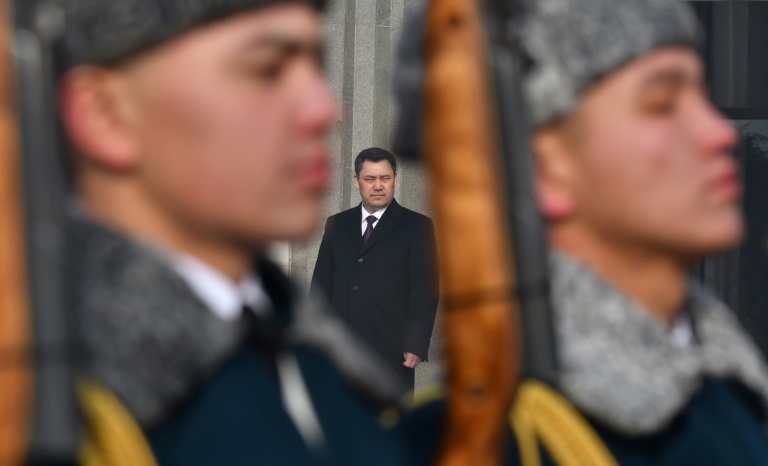For prime ministers in Kyrgyzstan, a poor and mountainous republic in Central Asia, the job description invites the very real prospect of jail.
Djoomart Otorbayev, 66, last week became the fifth former premier to be detained on corruption-related charges since January, when the ex-Soviet country overwhelmingly elected a new president, Sadyr Japarov.
The arrests spotlight concerns about fresh instability in the impoverished republic of 6.5 million ahead of parliamentary elections in November.
Three of the last four presidents were ousted in protests, in 2005, in 2010 and in 2020.
Japarov, who was catapulted to power in those last protests, recently strengthened his powers in a referendum that threw out single term limits.
The prime ministers have been detained mostly in connection with the country’s largest gold mine, a long-time political football that accounts for around a tenth of the economy and which the government wants to nationalise.
Supporters say the 52-year-old Japarov is making good on a campaign promise to clean up politics.
Opponents say he is pushing Kyrgyzstan towards a more authoritarian style of rule, as in neighbouring Kazakhstan and Uzbekistan.
“The biggest risk of all is to do nothing,” says Zainidin Kurmanov, a one-time parliamentary speaker supportive of Japarov.
He concedes that Japarov’s moves are risky, but argues the authorities “have a real electorate — the rural poor, who are tired of corruption, theft, poverty… they want to fulfil their pre-election promises to them.”
Kyrgyzstan is no stranger to crackdowns, but the recent scale of arrests is “unprecedented”, says Leila Seiitbek, a rights lawyer and the chairwoman of the Freedom for Eurasia nonprofit.
“The authorities are doing this demonstratively, apparently to intimidate and publicly show their impunity,” she added.
– Jailed for kidnapping –
Of the five ex-prime ministers detained this year, four are still in detention or under house arrest over corruption charges related to the Kumtor gold mine.
The five are Mukhammedkalyi Abylgaziev, 55, Kubanychbek Jumaliyev, 65, Omurbek Babanov, 51, Temir Sariyev, 58 and Otorbayev — all of them political figures dating back to the 1990s.
Jumaliyev is the only one to have been released.
In May, Japarov’s government moved decisively to seize control of the mine, appearing to follow through on a nationalisation bid that he launched before becoming president.
Centerra Gold, the Canada-headquartered operators, filed a lawsuit in response, and dismissed as “groundless” tax and environmental claims levelled by the authorities.
Japarov was himself jailed for allegedly organising the 2013 kidnap of a local governor during a rally against Centerra Gold, until last year’s protests propelled him into power.
He was sensationally busted out of jail by protesters during an uprising against vote rigging at elections last year.
It is a re-run of those elections that is planned in November.
Saira Umetova, 49, a clothing vendor in Bishkek, said that Japarov’s own experience gave her faith he could deliver on his promises.
“Sadyr has been through a lot.
He has lots of good ideas,” Umetova said. “Only he can lift us up.”
Japarov initially came to prominence as head of the country’s anti-corruption agency in 2008, although the agency steered clear of then president Kurmanbek Bakiyev’s family, widely viewed as steeped in graft.
Russia, which maintains a military base around 20 kilometres (12 miles) from the capital Bishkek, appeared surprised by last October’s events.
It is not yet clear if Japarov has fully earned Moscow’s trust.
– ‘Biggest risk of all’ –
A poll published last month by the International Republican Institute showed trust could be lagging at home too.
In July, 62 percent of people said they backed the direction the country was taking under Japarov, down from 70 percent in February and March, survey results showed.
The poll also showed that rising living costs — partly due to the impact of the coronavirus pandemic on the import-dependent economy — were a growing concern.
Borubek Kudayarov, editor of independent news website Kaktus Media, said Japarov’s crackdown resembled errors made by predecessors that sparked rallies and led to their ousters.
“The expectation is that politicians will be smart and agile enough not to step on the same rakes as their predecessors,” Kudayarov told AFP.
“The reality is that they just keep stepping on those rakes.”











